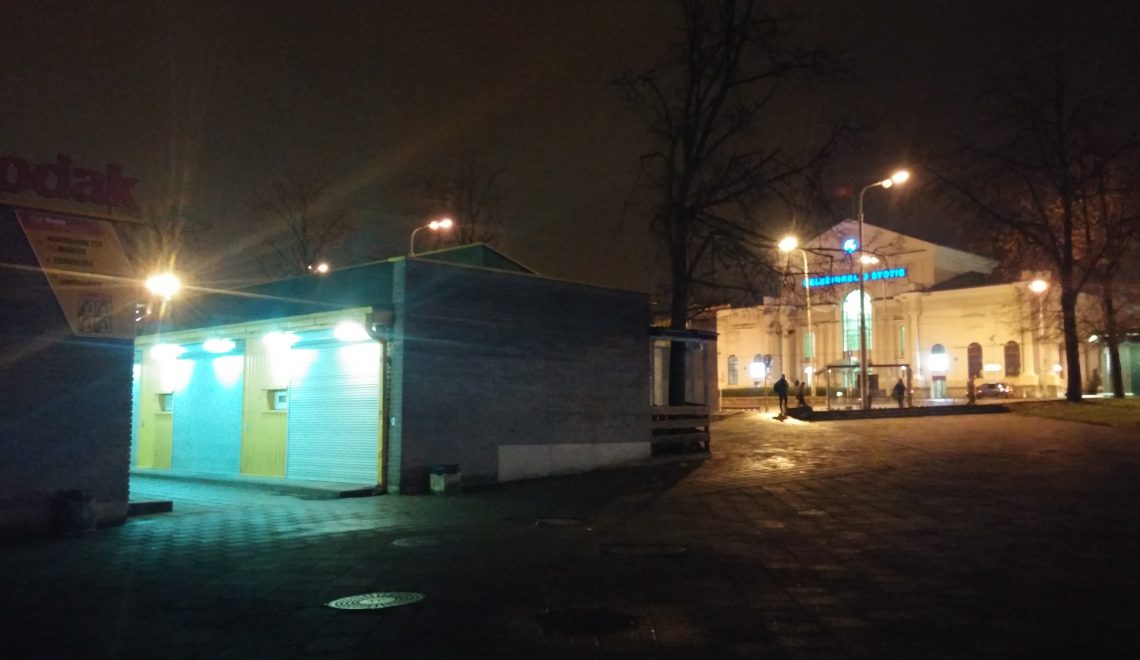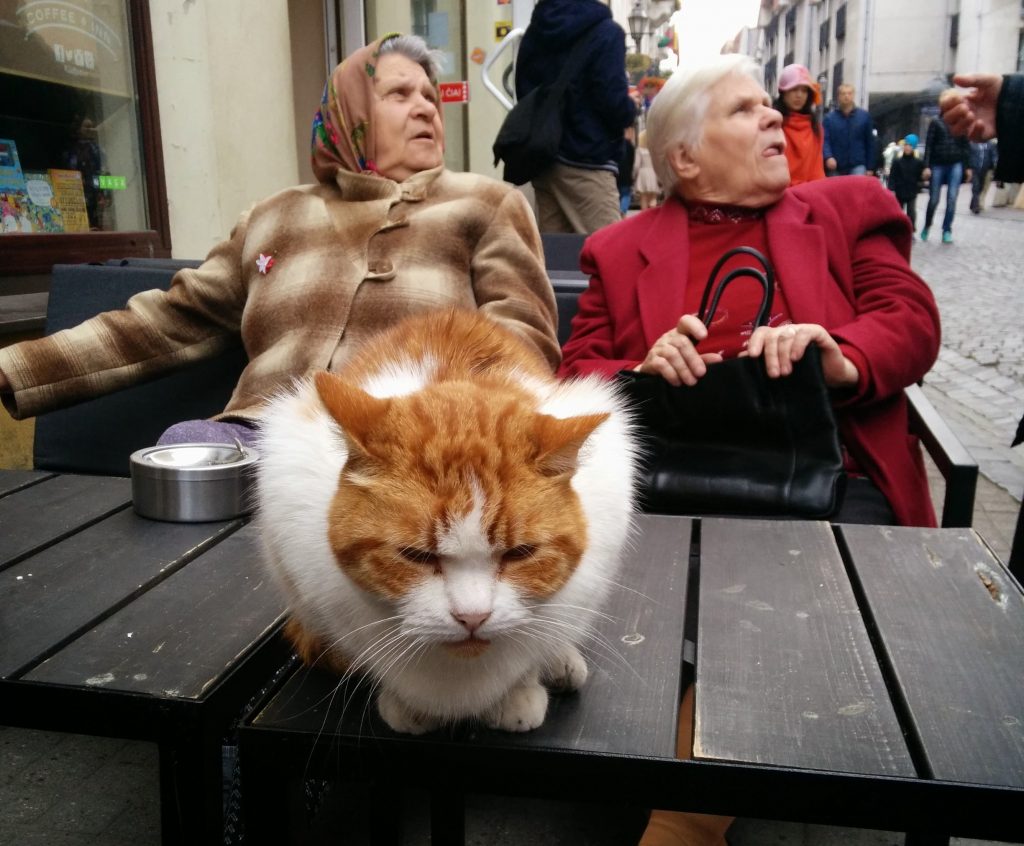Avoid the Area Around the Station

Since the first time I moved here I was told to avoid the area around the station at night. The Vilnius City Train Station is a commanding building with large blue sign shining in blue “GELEŽINKELIO STOTIS”. It stares you dead in the eyes from the bottom of the hill, deep in no-go territory. This place is harmless in the daytime; floods of people flow through here considering most buses end at the Station, and it being so close to the center. What is it about this place that has tantalized my curiosity? What went on here to make my family friends and relatives give me the same advice? This neighborhood is a story of changing times; to understand it, you have to understand the mentality and what came before.
The streets go dark early in a winter that subsumes Vilnius seemingly half the year. The northern latitude gives it a longer, harder, deeper chill than the snowy Michigan winters I endured growing up. Here the sun rises behind clouds like a veiled prince hiding his face from his people. The eternally grey days wear down on the psyche in sync with the realization that summer’s truly over. Is it the darkness that plants seeds of fear and mistrust in the night? Is it the generations that built our stereotype as a people who cheat the system to survive that lurk in the dark?
In the daytime, it’s safe, albeit obnoxious if you choose to loiter the stalls and shops between the train station and the bus station. Besides the Soviet era grandmothers carrying their large plastic bags, a variety of Eastern European tourist and Soviet sports jockey jostle in and around the area.
A Dying Flame
It’s an interesting time to live here. Like an old flame dying out to make room for the new; Vilnius and Lithuania as a whole is changing ever more from what it was when I visited as a child. I was born the same year the Berlin Wall came down. Two years later, the country my ancestors came from regained its independence. Two years after that, as a tiny capitalist flying over from the West, I saw it for the first time. What little memories I do retain were seen from my tiny capitalist eyes remembering how much I could buy with my American Dollar and how no one was overweight. The occasional years I’d come back with my family to visit my dad’s side of the family I noticed small technological leaps, however, it was still my father’s generation that governed.
That generation encompasses a mentality, unlike anything you can relate to unless you lived through it. When my father told me stories of Communists as a child, I had envisioned a stark white-faced race unlike my own, a breed of oppressors born with the genetic disposition towards dystopias. It wasn’t long before reaching my first decade did I come to the realization these white-faced Communists were mere lab rats of a system gone sour. The cruel conditions indoctrinated two generations of Lithuanians with a bitter view of the world; worse, it corrupted the ambitious, begetting even more party leaders to leash out on the common folk, further fractioning trust between neighbors. Growing up, my father’s stories told of a complete distrust towards one’s friends and neighbors, “You were encouraged to give up your closest friends if you suspected disloyalty among the party.”
Friends have shared their earliest memories taking their family’s ration tickets to the store to exchange for food. How many brands of bread, milk, and toothpaste were there to choose from? One, if it even counted as a brand. Like those of my generation, I can’t fathom living in such a distrusting society with only one brand of labor, food, and pleasure (unless you were born to the privileged class). It’s been 26 years since the first country, Iceland recognized Lithuania’s independence, yet it’s impossible to miss the looming grey Soviet blockhouses that dominate the neighborhoods outside of the center and in the center, expressionless concrete buildings still stand out between medieval and 19th-century architecture. A mood of somberness emanates from that dismal architecture and gray clouds which share the same Pantone colors.
I struggled mentally the first winter I tried living here. If it wasn’t the cold and the sight of bare trees while working in the daytime, then it was the seemingly endless nights that haunted me with cabin fever; a depression overtook me the days I didn’t leave the house, and the biting cold made sure I wasn’t out for long. It’s a difficulty many alleviate with alcohol. In fact, if you lived on the farms, as a majority of the population did under Communism, alcohol was not just a remedy but a sort of currency neighbors would pay each with. If your roof was damaged and you needed your neighbor’s help, often there were no Rubles to pay your neighbor, instead, you’d offer him Samogon, or literally self-distilled [alcohol], usually vodka; you’d get him drunk as payment.
Swindle to Survive
I find it ironic Lithuanians refer to themselves as a people that will seek out every loophole to survive. From freeloading trolley riding to falsifying documents so to avoid taxes, to driving hours over the Polish border to do bulk shopping, Lithuanians know how to cheat the system to survive. Here it’s seen as an art; the expression is usually mentioned with a sly grin. I can only imagine the needs from which it arose.
Though the Lithuanian Litas grew significantly in value since my childhood before switching to the euro, Lithuanians themselves are afflicted with a terrible economy. The minimum wage will earn you roughly €380/month. Is it any wonder young Lithuanians in search of opportunities are flocking out of the country; since 1990, Lithuania has lost almost a quarter of its population to countries like Norway, Great Britain, and the United States, not to mention those that fled during the second world war, like my mother’s parents. Even the Lithuanians abroad I’ve met retain aspects of this mentality, cheating the system. Is it any wonder we have such a bad rep among other countries?
If you’re young and able to flee then you’re lucky. Many who staked their futures and their youthful formative years on a society that broke down are living in a gerbil’s wheel, working unskilled jobs shuffling products at a cash register with no brighter future in sight. You won’t have trouble finding a grandmother roaming the streets, wishing for the old days to return. Back in the day, farmers and city dwellers may not have lived with luxuries, yet they knew how they’d get by. Though there was no variety, they knew they’d always have something to put on the table. Even if the work they did served no other purpose than giving them something to do, and even if the food they ate was flavorless, and coffee bitter, it could be expected like fall after summer. Then, like a wrecking ball, capitalism came and demolished the foundations of everything they knew. Now, poor neglected bonnet wearing babushkas still line the intersections of Gedimino Prospect, Vilnius’ main avenue, and they sell flowers to survive. I still wonder where they get their flowers, as I’ve never encountered a grandmother picking them, though that’s another story.

Epochal Lottery
My generation that was born in Lithuania may not have won the sperm lottery, however, compared to their parents, they won a different lottery in that they aren’t constricted to living in the Soviet Block. One can gauge from which generation an adult Lithuanian comes from or is influenced by judging by how well he or she speaks English. My father’s generation speaks Russian as well as it speaks Lithuanian, and Russian is still heard everywhere. As beautiful as the language is, most younger folks I’ve met find the Russian language disgusting, being the language associated with oppression. Alongside that disgust, another contradicting trait I notice among the younger generation is a sense of empathy. Distrust still reigns supreme among the older generation’s mentality, so much so that they might tell you to fuck off if they’re carrying too much and you offer to help. I see this distrust in the older people in their unwillingness to help, say exchange a 5 Euro bill into coins, or if I’m in a hurry, let me cut in line at a store if I have one item (I’ve tested this out with younger people and got opposite results).
Right now, this harsh contrast between the young and old is at an equilibrium soon to be dominated by the young. Tech is taking over; Vilnius is growing at an unseen pace with developments like the Vilnius Tech Park. The city center is constantly changing like a snake shedding its skin. Like the changing of hands from one generation to the next, this neighborhood around the station is losing its notoriety. I still see remnants of a troubled neighborhood, whether it be the rugged looking man in the wheelchair gazing restlessly while swearing in Russian, but I don’t feel endangered. They say new ideologies come into effect with the death of older generations. My father’s generation proved they can survive in the worst of times, however, their close-minded mentality of distrust has no room in this new age. I’ll never fully grasp what my father’s generation lived through under Communism. I’ll miss their ingenious survival tactics, but I won’t be sad when they’re gone.
